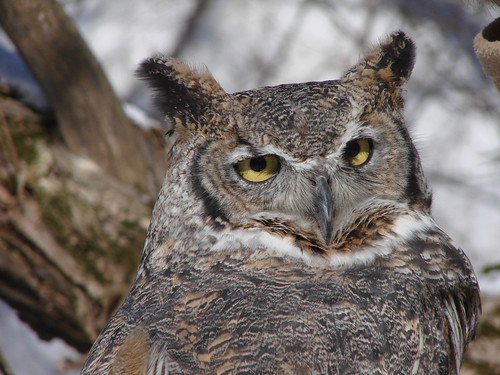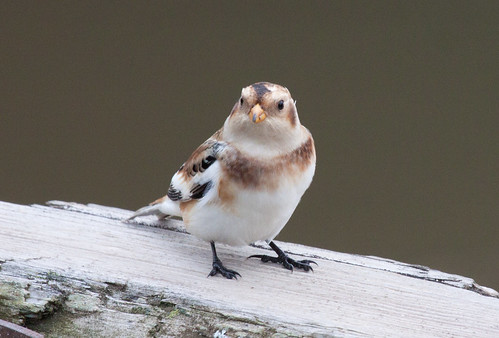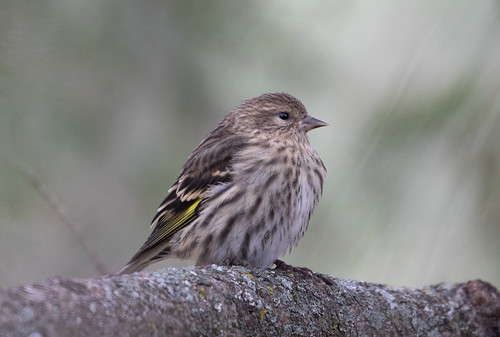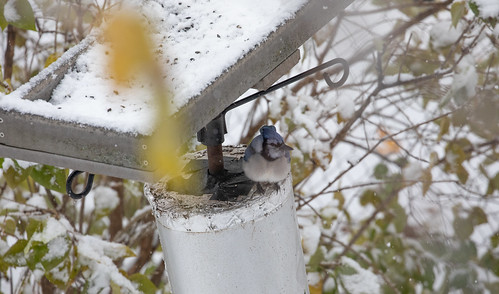With our first winter snowfall—the one that took place in November as opposed to the one in October—my feeders have been pretty busy, though not nearly as busy as they were just a few weeks ago. The morning after the snowstorm, a male cardinal showed up, along with both a male and a female Pileated Woodpecker. A female Red-bellied Woodpecker has been coming every day lately, and I’m figuring she will be spending the winter—she keeps flying off with sunflower seeds to wedge into the bark of nearby trees.
In the evening on November 11, my son-in-law said he was hearing an owl through the window, and sure enough, two Great Horned Owls were hooting right in the yard. They didn't stick around long, but that was a splendid birthday gift!
This fall I’ve had more Fox Sparrows than I can ever remember having in autumn before, but their numbers ebbed away, and now I haven’t seen one in several days. I had one exceptionally late Lincoln’s Sparrow the first two days of November. Since the snowstorm, a couple of White-throated Sparrows are still here, along with a couple dozen juncos.
I still have several Red-breasted Nuthatches—they're appearing in a lot of places south of here this year, delighting a lot of my friends on Facebook. Here in Duluth, we have at least a few most winters, but even though they're among my "usual suspects," they're always delightful to see. All this year, chickadees have been more plentiful than they've been in several years, which I of course find delightful. Even so, where I was getting 18 or 20 species a day in my yard the last half of October, now I’m lucky on days when I have a dozen.
I’ve been hearing from lots of people seeing Snow Buntings, especially along the highways hugging Lake Superior’s North and South Shores. I’ve only seen them on Peabody Street a handful of times over the years, always after the plows came following a heavy snow, and none this year, at least so far.
People all over the place have been seeing winter finches, and I’m trying not to feel envious. After having hundreds of Pine Siskins a day through much of October, I’d gone several days without a single one, though after the snow, I did have an even dozen again. Facebook has been popping with photos of redpolls, but small numbers have shown up in my yard only a few times. Pine Grosbeaks, one of the loveliest of winter finches, have been seen here and there, except on Peabody Street.
And saddest for me, despite the huge influx of Evening Grosbeaks I’ve read about all around here, not one has appeared yet in my yard. Back in August 2011, a flock of 16 turned up in my yard and remained for weeks, pigging out at my feeders and in my box elders and visiting my bird bath. From morning till night I could listen to them, just as I could back in the 1980s when we first moved here, and I could watch the young birds begging from and getting fed by adults.
It seemed so promising after the species had declined so dramatically in the 90s, but that was the last time I’ve had more than a single Evening Grosbeak in my yard, and the last time I’ve had even one Evening Grosbeak for more than a few minutes or more than a single time in a whole year. This is one of my favorite birds because of all the wonderful associations I have of it when I was a brand new birder visiting Russ’s parents up here, and then from when we first moved here—the Evening Grosbeak was the first bird I heard in my yard and the first species to come to my bird feeder when we moved here in the summer of 1981, and it was a almost constant presence when my children were babies and toddlers. Periodically, Russ and I would rent a video camera back then to record our children doing adorable things, and whenever we were recording them in the back yard, grosbeaks could be heard in the background. So I’m very much yearning for them to appear once again on Peabody Street.
My family of three Blue Jays is still sticking around. I bought a special peanut feeder from my local Wild Birds Unlimited—a donut-shaped feeder made of wire. The adults figured it out instantly and come a few times every day to carry off peanut after peanut. They’ve been squirreling them away here and there, including in our electric meter box—evidence, as it is for my female Red-bellied Woodpecker, that they’ll be sticking it out for the winter. And even though it’s mid-November now, the young is still begging from the adults and following them about rather than pulling its own peanuts out of the feeder. This seems phenomenal. I wonder if it’ll stick around through spring and then help them rear next year’s young, as Florida Scrub-Jays do, or if this is a simple case of Failure to Launch.
Identifying and counting birds barely scratches the surface. I may not have as much variety or as many individual birds right now as I had in September and October, but there’s still plenty of fascinating activity to see as long as I pay attention.










